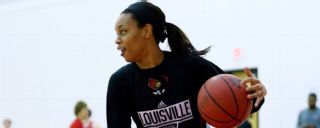"Coaches watched her play, wrote letters asking her favorite foods, cartoons," Audrey recalls of how her daughter's ballhandling skills lured a stream of recruiters to their hometown of Douglasville, Georgia, when Asia was still drinking out of juice boxes. "She was soooo young when it started."
By grade school, Durr was already that rare combination of a gifted player with a fanatical work ethic. The type of player who quickly becomes not just a steadfast guiding star but a repository for hopes and dreams. The player charged with elevating the team. The shiny object that brings home the shiny objects.
In high school at St. Pius X Catholic High, "Every coach who visited said, 'We'll make Asia the face of the franchise,'" Audrey says. "It was ... a lot."
She recounts the day UConn coach Geno Auriemma came to visit the family house -- "so handsome in person" -- and stayed long enough he joked, "What time is breakfast?" (Charming as Auriemma might have been, Durr became the highest-ranked senior to sign with Louisville, a place she told her mother felt most like home.)
"It was entirely her choice. She wanted a national championship. She wanted to improve. But she also wanted to be wanted," Audrey sums up as Durr finally walks in, flanked by her brothers, Christian and T.J.
"There she is!" Audrey says, beaming.
Durr tries to apologize for her tardiness, but no one can hear her words because she is immediately enveloped in hugs and conversation. Everyone talks at once, Durr doing her best to have an audience with each person, breaking into laughter as she surveys the hectic scene. "Dang, we roll deep," she says.
She slings an arm around the shoulder of her old AAU coach, Tim Wilcox, who blushes slightly as she introduces him to a family friend as, "the man who coached me through the good and the bad."
"You had your moments," Wilcox reluctantly concedes, "but the best players you only have to correct once. You earned this."
"Coach Wilcox told us we only needed to consider big-time schools," Audrey tells the table, "because Asia rises to the big time in her game."
At that, Christian protests good-naturedly, talking smack about being the real baller in the family. Asia challenges him to hit the court right now and settle the matter. Instead, they slide into chairs and order spinach dip, Asia muttering, "You know I'm right," under her breath.
She keeps one eye on a nearby screen, where the Duke-NC State game is airing, and chats with Kinley Coggins, a fan turned friend, who has driven with her family from Tennessee to watch tomorrow's game against the Miami Hurricanes. Kinley's mother, Lisa, explains that her 14-year-old daughter has been captivated by Durr ever since the two met at a basketball camp several years ago.
"We go to as many of Asia's games as we can," Coggins says. "Kinley made sure her jersey number was 25, like Asia's. She has Asia posters and photo collages hung in her room. She calls Asia her 'big sis.'" When Kinley injured her leg and was unable to play for several games, Durr checked on her every week. "Now you tell me what other player of her stature would do that?" Coggins asks, eyes wide.
Durr, 22, has a reputation for kindheartedness. One that hasn't abated with success. The 5-foot-10 senior guard, who could be the No. 1 pick in the WNBA draft, finished college with career highs in assists, rebounds and steals. Moreover, she's the undisputed Queen of Buckets, scoring more smoothly than butter on toast, notably racking up 47 points in a game against NC State, matching her own Louisville record. Blingy stats for a decidedly unflashy player.
"She's not a kid that when you meet with her, you think, 'Oh she believes she's better than everybody else,'" says Cardinals coach Jeff Walz, who adds that when friends visit practice, they confess they can't tell who is the superstar. Durr's not the first player you notice on the court. She's not the tallest or the biggest. Her feet look large for her body, her calves thin. Her style isn't showy or loud, more like a bird of prey, her eyes darting left and right, tracing and tracking, never missing the smallest opening to swoop in and exploit weakness. A merciless acuity she often turns on herself.
"More than anything, Asia wants to be a good teammate," Walz says. "One of the biggest challenges I have with her is coming out of halftime she'll ask, 'Did I shoot too much?'" He laughs. "Asia always wants to please everybody."
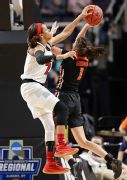
DURR WAS 10 years old when she first recognized her gravitational pull. She was playing in the YBOA national tournament in Florida. Her whole family had traveled to watch her compete. Durr's team lost, but what she remembers most are the faces of her cousins and siblings screaming her name and cheering from the bleachers. "It was like, oh wow!" It felt something like church. It felt something like power.
That same year, a precocious Durr was tapped to star in a commercial for the Atlanta Dream. In the ad, she shot playground ball against the boys, puncturing their defense like a needle through skin. The filming lasted morning to night, but Durr didn't mind. She already lived on the court, working herself weary, repeating moves again and again. Aside from the cameras, the commercial shoot felt like any other day.
Durr had no idea at the time that she would turn pro, that she would manifest the very fantasy she was selling, a voiceover in the advertisement posing the question, "Ever wonder what happens to girls like this?" before fading from young Durr to a shot of a WNBA Dream player and answering, "They grow up into women like this."
Durr was born a month early, weighing only 4 pounds. Her fragility was quickly overcome, but still reverberated through the family consciousness. Durr was to be protected. Her resilience celebrated.
"When she was a preemie, the nurses would tease me about how much milk she drank," Audrey recalls. "They said she came out early because she was hungry."
Durr describes her mother, a grant analyst at the Centers for Disease Control, as strict -- the type of mom who would drag you by the ear from a bad situation. Not that Durr ever found herself in one.
"I didn't go to parties," she says. "I didn't go to prom 'til my senior year. I didn't do much. I played basketball, then gym till 8:30 p.m., went home, ate. That was it. Every single day. Literally."
Durr's commitment, married with her incontrovertible talent, soon made her the sun in the family. The light everyone orbited around. When they were children, Genesis ironed her little sister's clothes. Braided her hair. Wiped her nose. She didn't want little Asia walking out of the house a mess. Genesis still tries to glam her baby sister up. Efforts almost always met with a hard pass.
"The last time I got her in a dress was on a trip to Miami last year," Genesis says, producing a selfie on her phone, the sisters done up for a night out, gorgeous glitter bombs goofing for the camera, Durr's eyes betraying slight embarrassment.
For as long as Genesis can remember, her sister has been notoriously shy. In high school, Durr rarely spoke. She had a stutter, same as her father and her older brother, Christian. The stutter kept her on the social margins, silent in her shell.
"I didn't want to talk to people," Durr says of those years. So she hooped, let her game speak for her. Still, she stayed reserved, and prone to self-punishment.
"I used to beat myself up after every game," she says. "A regular-season game, a playoff game, a championship game, didn't matter -- I would cry."
Her solution was always: train more. Given the choice, Durr would never leave the court, her devotion to practice and drills approaching pathology. Over the years, her coaches have had to force her to train less.
"She's always working before and after practice," Walz says. "She's one of the hardest workers I've ever coached."
Freshman year of college, Durr's obsessive regimen launched her directly into her first wall. "A brick one," she says.
"I trained with a torn groin for a month. I squatted, I maxed out. Coach Walz was like, 'You dumbass, why would you do that?' I was stubborn."
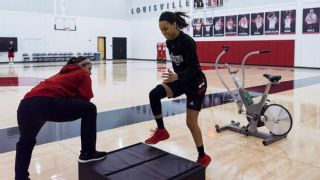
After surgery, where doctors had to "shorten my muscle, pull it up and flip it over," Durr suffered. Her scar tissue caused agony that required frequent cortisone shots. She'd never missed more than a handful of days on the court, but rehab wasn't proceeding at the pace she'd hoped, and weeks on the bench bled into months. Durr felt pressure to bounce back for the team, expectations she tortured herself with every day she wasn't playing up to snuff.
"My recovery threw a monkey wrench into everything," she says. "I started doubting all of my choices. I couldn't really be myself. I couldn't play basketball like I knew I could. The whole year, I was up and down, up and down. I just kept thinking, What am I gonna do?"
The back and forth in her mind was leveling. Uncertainty, a new emotion. Without basketball, Durr's very identity was in danger of dissolving. She'd been on one track her whole life. The derailment was a shock.
"I was angry, I was upset, I was depressed. If I could've gone back and been smarter about things ..." Durr's voice trails off. She clears her throat. "I fell into a very, very dark hole."
Durr now says the injury forced her to figure out what life meant outside of basketball: "When stuff like that happens to you, God is trying to teach you something." She examined the point of all the hours, the wins, the dedication, the sacrifice, and decided the message was not that she worked her body too hard but that she didn't work her mind enough. Her mother had always told her, "Never let anyone see that they got you beat." The message stuck.
"I've always been this person who held stuff in, went, go, go, go," Durr says. "And you can't do that forever. You can't."
Durr says she is smarter these days. About her mental health, the limits she didn't know she had. She admits she suffers from circular thinking, anxiety that roosts in her brain and makes it difficult to relax. So she meditates, listens to Deepak Chopra. She goes to therapy, examines her fretfulness, her need to please, to never disappoint. She doesn't want to be a tripwire. She wants to tame the swarm of bees in her brain.
"I still get rattled, overwhelmed, but I'm developing tools to calm myself down," she says. "Like, yesterday I didn't shoot the ball well." Durr says the old her would have been internally lacerating herself like it was her job. But the new her breathes deep, lets go.
"If I'm going to sit here and get all sh---y about how I played, then I need to recheck myself," she says. "Life could always be worse."
During Durr's recovery year, Walz, who also has a stutter, showed a disheartened Durr a video recording of one of his disastrous news conferences where his words didn't come easily.
"It was awful. I looked like Bozo the Clown," he says, cringing.
As they watched, Walz gave Durr some advice.
"Laugh at yourself. Be proud of who you are. Don't try to be somebody else. No matter how bad somebody else wants you to."
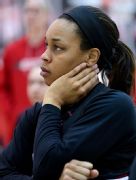
ON GAME DAY against the Hurricanes, Durr warms up so early she's largely alone, save for the security crews filing in for pregame checks.
Off to the side, a buoyant Audrey and Genesis cheer, "We ready, we ready!" as they stomp their feet. Durr shakes her head, fires off a practice shot. "I'm trying to concentrate over here," she says.
The ball swishes.
"Night, night," Genesis calls out -- her sister's catchphrase -- as Durr stifles a laugh.
A few hours later, the game is an upset, Louisville losing 79-73, Durr scoring only 16 points. Even with the loss, the postgame line for her autograph reaches the rafters and snakes along the top row, fans of all stripes waiting more than 30 minutes to take a photo. Durr smiles, greets the fans warmly, but in the seconds between, her face falls.
Afterward, in the media room, Durr has stopped bothering with the veneer, wilting like a flower at the press table. When asked about the game result, she leans over to the microphone, says flatly, "I sucked today. I played like butt."
The next morning, dressed in gray sweats and a hoodie, sock feet in slides, Durr climbs onto a raised table to tend to her knee in the Cardinals' treatment room. She wraps her leg in a compress, pumps ice water through it. On her wrist, she checks the bracelet that tracks the hours she sleeps.
Leaning back, Durr says she regrets using the language she did after the game, but "it is what it is. Life can't always be all sunshiny, right?"
She changes the subject to her unerring love of basketball, how you can never master the game, how that's where her love springs from. She speculates about the upcoming draft, and the Las Vegas Aces, who, with the first pick in the draft, could pounce for a scoring threat. Durr says she doesn't have a preference for a team; she just wants to be wanted, wants to be seen.
"I'm trying to find how can I grow," she says.
For her game and her psyche, that means honing her defensive strategy, becoming less of a fireman and more of an architect. Acting more like a boss, less like the employee of the month.
"I'm most proud of the person I've become," she says. "I didn't let freshman year break me."
Sometimes, instead of meditating, Durr takes long solitary drives. Windows up, rap thumping, vibrating the glass. She doesn't follow any route, stays mostly on the back roads, trying to empty her head while she cruises along.
"Cause if I don't ..." she starts, but doesn't finish.
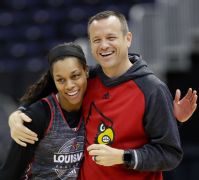
Durr mentions a recent lunch when she was approached by squealing fans. It took her back to her younger self, meeting players. How much those women meant to her, proof of what could be.
Back then, the St. Pius cafeteria staff would beg Durr not to change if she ever went pro. Imploring her to stay the gentle, sweet, humble girl they knew and loved.
Durr remains those things, but she has evolved.
"God knows I'm so thankful," she says, before referencing Kobe Bryant, a player whose mentality she admires. "You can see the dog in him, the grit, like he wasn't going to be stopped." Durr feels the same hunger -- even if her nice-girl demeanor makes it harder to see. Yes, she is grateful. She is kind. But she isn't satisfied. Satisfaction lives only in the future.
"Honestly, I don't think I realized how powerful I can be as a person," Durr says. And then, as she rolls to one side, adjusting her knee, she adds in a voice so soft you can barely hear, "I always care too much."

